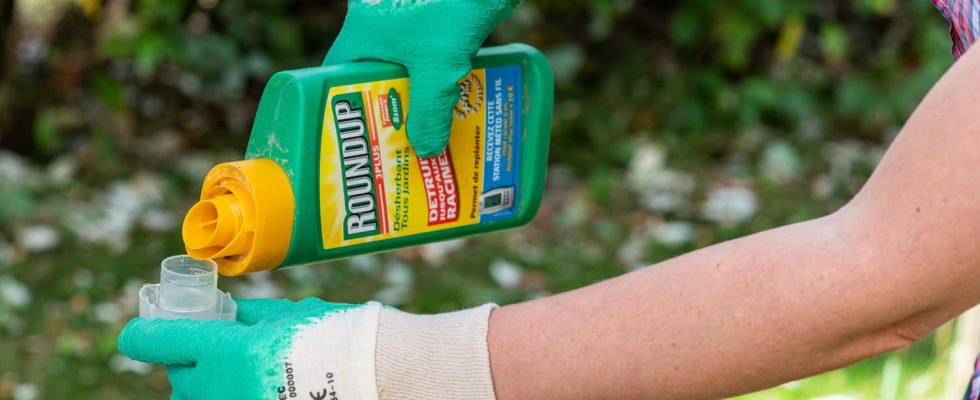A cheap weedkiller, glyphosate (the flagship product of Monsanto’s Roundup) is the best-selling herbicide in Europe. Suspected of being bad for health and particularly carcinogenic, its use is widely controversial in Europe and France.
Glyphosate, the flagship product of Monsanto Roundupis a herbicide used for eliminate “weeds” and undesirable plants on fruit trees, vineyards, wheat or rapeseed crops, railway tracks, industrial sites, etc. cheapglyphosate is also part of the composition of more than 750 products marketed by more than 90 manufacturers. Problem: residues of this pesticide can be found in our waterways, but also in our food and can have effects on our health, probably carcinogens. A look back at the history of this widely controversial substance.
What is glyphosate?
THE glyphosate is a weedkiller, but not just any weedkiller: it is the ingredient in the flagship product of the American firm Monsanto, Roundup. Patented in the 1970s and falling into the public domain in the early 2000s, this “total herbicide” (i.e. which attacks all plants without distinction) is used by companies, individuals, on industrial and agricultural land, but also on railway lines.
Is glyphosate authorized or prohibited in France?
The use of glyphosate is currently authorized in the European Union until December 15, 2023. After this date, its authorization in Europe will have to be renewed. Until this date, glyphosate can therefore be used as an active substance in plant protection products (PPP), provided that each PPP is authorized by the national authorities of each country after an assessment of its safety. For his part, France has developed a plan to completely ban glyphosate by 2023, with interim steps to reduce its use. However, there is exemptions for certain specific usessubject to environmental and health guarantees.
What are the health dangers of glyphosate?
Several scientific studies have suggested that glyphosate may pose risks to human health. The World Health Organization (WHO) has classified glyphosate as “probably carcinogenic to humans” in 2015. This classification was based on animal and epidemiological studies suggesting a link between glyphosate and certain types of cancer, in particular non-Hodgkin’s lymphoma. Other agencies, such as the European Chemicals Agency (ECHA) and the United States Environmental Protection Agency (EPA), however, have expressed different opinions and concluded that glyphosate is not not an established human carcinogen. Furthermore, some research has suggested that glyphosate may disrupt the endocrine system, particularly by interfering with sex and thyroid hormones. However, these findings remain controversial and require further research. All of these concerns have contributed to the massive reduction in glyphosate use. Also, this product poses a problem from a point of view environmental : its intensive use can cause biodiversity loss, soil and water contaminationas well as weed resistance to herbicides, with considerable negative impact on the environment and agricultural sustainability.
Photo of glyphosate (Roundup)
Key dates in the history of glyphosate
► In March 2015: glyphosate causes concern. Indeed, he is suspected of being a “probable carcinogen“, according to the International Agency for Research on Cancer, a branch of the World Health Organization (WHO) based in Lyon.
► In November 2015: the European Food Safety Authority (EFSA) considers it “safe”.
► In May 2016: another United Nations report – of which the WHO is a part – considers the carcinogenic risk as “unlikely”. What sow a little more trouble in this case.
► In June 2016: as a precaution, 132 glyphosate-based products containing the co-formulant POE-tallowamine are withdrawn from the market in France. Unacceptable risks, especially for human health, cannot be excluded for these products
► In December 2017: the active substance glyphosate is re-approved by the European Union for a period of 5 years, i.e. until December 2022. The European regulation requires that additional data be provided when evaluating products containing glyphosate, including the genotoxic properties of products containing glyphosate.
► In December 2018 : withdrawal of products from the market without filing an application for renewal of their marketing authorization.
► May 10, 2019: the Commission has appointed four Member States (France, Hungary, Netherlands and Sweden) to jointly act as “rapporteurs” for the next assessment of glyphosate – this group of Member States is known as the Glyphosate Assessment Group.
► In December 2019 : products for which a lack of data does not allow the evaluation of the genotoxic potential of the product to be finalized are withdrawn from the market.
► The September 1, 2020 : withdrawal of glyphosate-based products from the market from the amateur rangeas part of the ban in France on the use and possession of all plant protection products for non-professional uses (implementation of the Labbé law of 2017), with the exception of biocontrol products, low risk or authorized in organic production.
► In October 2020: ANSES publishes the results of its comparative assessment of non-chemical alternatives to glyphosate which led to modification of employment conditions of these products as part of the evaluations of their marketing authorization application. Verdict: the use of glyphosate is prohibited in situations where it can be substituted by a non-chemical solution. For example, the mechanical weeding practiced between the rows of vines and fruit trees, or the use of grassy areas. In the case of field crops, plowing between two annual crop cycles makes it possible to dispense with the use of chemical weedkillers.
► In December 2022the European Commission one year extension authorization of use of glyphosate, until December 15, 2023. This decision was taken to allow EFSA to complete its peer review, which is due to be completed in July 2023.
► In July 2023: Conclusions of the EFSA peer review are sent to the European Commission, which will have to decide whether or not to renew the use of glyphosate in Europe.
- Glyphosate: ANSES publishes the results of its comparative evaluation with available non-chemical alternatives
- European Food Safety Authority (EFSA)
- Glyphosate – European Commission
